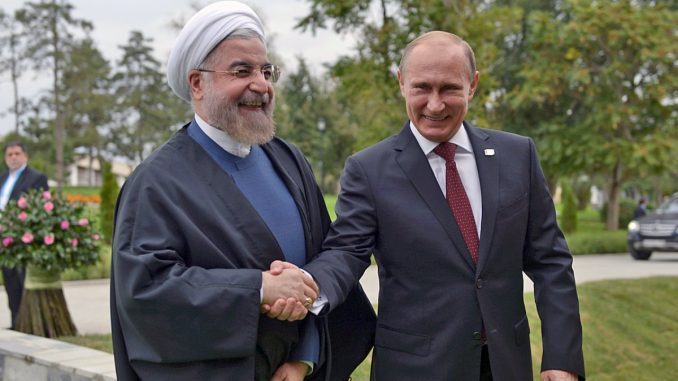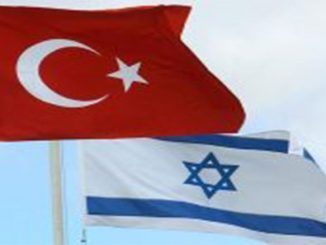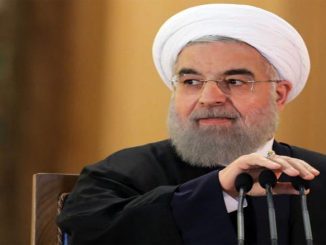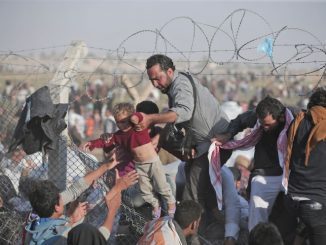
Iranian president Hassan Rouhani traveled to Russia to meet the Russian president and other prominent figures as part of their efforts to expand their power in the region, strengthen political and diplomatic ties, create new economic cooperation chances, and step up joint military operations in Syria.
Russia and Iran found a natural ally in Bashar al-Assad and his regime, and together they made an alliance to save its rule and accomplish their own agenda in the area.
Iran is seeking to widen its influence in the area and Syria was the perfect next step
Tehran supported Assad regime by money and fighters to defend his role, in return for freeing its hand in Syria to achieve its long-awaited dream. Iran started a demographic change in the Sunni-populated areas in Syria and sought to change the face of the Syrian cities by forcing the Shiite festivals in the heart of Damascus, adding Syria to the list of its controlled areas and making it gradually the 32nd Iranian province.
Russia lost most of its global power after the Soviet era, and became politically weak after the UN security council ignored its veto more than once to achieve opposing plans as in the conquer of Iraq. Russia found in Syria the chance to retrieve its place especially with Obama in the white house.
Russia sent the might of its forces to Syria and saved Assad regime from being overwhelmed by the rebels and became the real governor on the ground.
Russia’s influence in Syria made it able again to contradict the west’s strategies and forced itself again as an essential player in the global issues.
Rouhani’s visit and the expected goals
Iranian President Hassan Rouhani is on an official two-day visit to Moscow, meeting with his Russian counterpart Vladimir Putin to discuss a range of bilateral and regional issues.
The trip is taking place during one of the most important periods in Iran and Russia’s relationship, with the Syrian crisis having become a showcase of the growing partnership between the two countries.
The true significance of Rouhani’s visit can best be understood by taking into account several key points.
First and foremost, it should be noted that it is Rouhani’s first official visit to Moscow, and technically it is the first time the two leaders will meet within a purely bilateral framework. Although it is the ninth time Putin and Rouhani will have met face to face, their previous meetings were held either on the sidelines of international events, such as the UN General Assembly meeting, or in the context of multilateral initiatives. The last time they met was on Aug. 8, 2016, when they joined their Azerbaijani counterpart Ilham Aliyev for a trilateral summit in Baku. Putin’s only visit to Tehran during the past 10 years took place on Nov. 23, 2015, for a summit of the Gas Exporting Countries Forum.
Second, the visit takes place as the regional partnership between the two countries with a focus on Syria has entered a new phase after Iran was officially named alongside Russia and Turkey as one of the guarantors of the Syrian cease-fire.
While there had been suspicions in Iran regarding Russia’s long-term plans for Syria, the move has ushered in a new and more solid phase of the Iran-Russia partnership, and in this vein, Rouhani’s visit could help the two countries devise a road map for their future steps in Syria.
The third point is that Rouhani’s trip could reinvigorate the trilateral Iranian-Russian-Turkish axis on Syria and increase its significance. Although some high-ranking Turkish officials’ recently adopted anti-Iranian positions soured Iran-Turkey relations, Ankara’s unprecedented and growing rift with some European Union member states has overshadowed the conflict with a more urgent challenge for Turkey than its regional competition with Iran.
As Ankara is anticipated to once again look to the East to balance its deteriorating relations with the West, it is possible that Moscow will try to seize the opportunity to compel Iran and Turkey to come together, with Moscow as the centerpiece, leading to more coordinated efforts by the three countries to resolve the Syrian crisis.
Fourth, Rouhani may be seeking to strengthen Iran’s relations with Russia ahead of expected new relations with both the west and Israel, and ensure a place for Iran in Russia’s upcoming foreign policy.
Iran is worried that Putin will normalize ties with what appears to be a more Russia-friendly Trump administration.
“There’s a big concern in Tehran that Moscow will use it as a bargaining chip for better relations with Washington,” said and analyst, adding that “Rouhani may need if not solid guarantees then at least some confidence that Putin will not undercut Iran.”
There are similar worries among Iranian leaders over Russia’s relationship with Israel, which has carried out strikes on Hezbollah targets and Iranian ground forces in Syria.
Putin has been able until now to contain the contradictions of a policy that accommodates Israel as well as its enemies, but this mission is being harder as the proxy war in Syria became more complicated, therefore Rouhani may be seeking guarantees from Putin regarding this matter.
Fifth, Rouhani’s visit takes place just a few months before Iran’s May 19 presidential elections. During past months and especially after the US presidential vote, in which Russia is accused of interference, speculation has been raised by some Iranian media outlets that Moscow will try to meddle in the Iranian polls, too.
The argument is that Russia is dissatisfied with Rouhani’s diplomatic opening to the West and prefers a conservative, more anti-Western Iranian president. With less than two months left before the Iranian presidential elections, Putin’s meeting with Rouhani could help Moscow put an end to — or at least decrease — the intensity of Iranian suspicions about Russia’s view of the Iranian elections.
In addition and ahead of the election in Iran, Rouhani is trying to solidify his position and demonstrate that while he has been willing to negotiate with the West and the United States, he is equally willing to solidify Iran’s relationship with Russia.
Finally, Rouhani is definitely seeking new economic relations with Russia including new Iranian arms purchases and Russian investment in the Iranian energy sector.
Iranian media say he will discuss several economic agreements – potentially valuable prizes for the moderate leader, who is keen to show his people that Iran is benefiting from its 2015 deal with world powers to rein back its nuclear program in returning for an easing of international sanctions, because he has been repeatedly accused by his opposers, the hardliners, of giving up the nuclear program for nothing in return.
The hardliners criticize Rouhani for failing to fulfill his promises on improving the economy and creating new job opportunities, while the unemployment rate in increasing,
In addition, the latest US threats to Iran made many European companies reluctant to sign new deals with Iran, therefore Russia’s visit is the perfect chance for Rouhani.
“Rouhani desperately wants to finalize at least one deal based on new petroleum contracts before the election,” said Reza Mostafavi Tabatabaei, an energy analyst and president of London-based ENEXD, a firm involved in the oil and gas equipment business in the Middle East.
“Western companies like (France’s) Total (TOTF.PA) are waiting for U.S. approval before any investment in Iran, so Rouhani’s only chance is Russian companies that might sign a deal before the election.”



